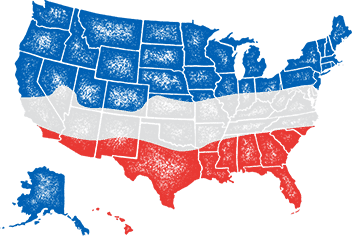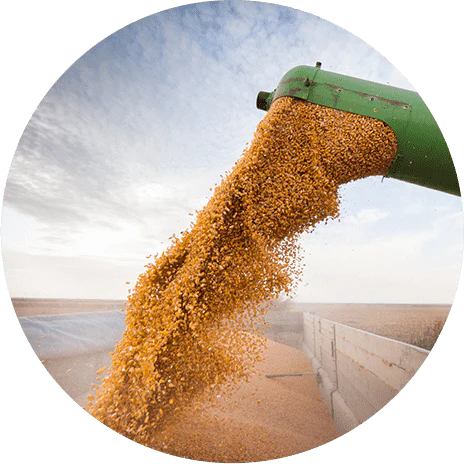
- When to plant:
- Spring, Fall
- Fertilizer:
- 10-10-10 All Purpose Fertilizer
- Seeding rate:
- 18 - 20 lbs. per acre
- Overseeding rate:
- Not Applicable
- Seeding depth:
- 1/4 - 1/2 inch
- Ideal ph:
- 5.6 - 7.5
- Gmo:
- No
- Inoculant needed:
- No
- Coated or raw:
- Raw
- Lifecycle:
- Perennial
- Climate zones:
- Cool Season, Transition Zone, Warm Season
Alfalfa (Medicago sativa) is a cool season perennial legume living from three to twelve years, depending on variety and climate. Alfalfa seed is most commonly planted for hay production, wildlife food plots and grazing. Alfalfa is the most popular legume in the world for hay and forage production for cattle and horses. Alfalfa resembles clover with clusters of small purple flowers containing high protein, vitamin and mineral rich leaves and stems. Alfalfa is very appealing to all forms of wildlife and remains as one of the best Alfalfa seed is commonly sprouted and eaten by humans as well. The Fall dormancy is 9.
Product Information
-
Application or Use: Ground Cover, Cover Crop, Cattle Forage, Livestock Grazing, Food Plot, Hay Production
- Germination Time: 7 - 14 days, under optimal conditions
- Growing Locations: Warm Season, Transition Zone, Cool Season
- Height: 1 - 3 feet
- Sunlight Requirements: 6 - 8 hours, full sun for best results
- Advantages: Controls harmful nematodes; nitrogen fixation; builds organic matter.
- When to Plant: Recommended planting time is fall and spring when nighttime temperatures are consistently below 65 degrees.
Product Details
- Highest feeding value of all common hay crops
- Nitrogen-fixing abilities
- Highest yielding forage plant
- Wide range of adaptation
- High protein content
Product Information
Alfalfa Food Plot Seed grows to a height of up to 3 ft, and has a deep root system sometimes stretching to 15 ft. This makes it very resilient, especially to droughts. It has a tetraploid genome. The plant exhibits auto-toxicity, which means that it is difficult for alfalfa seed to grow in existing stands of alfalfa. Therefore, it is recommended that alfalfa fields be rotated with other species (for example, corn or wheat) before reseeding.
Like other legumes its root nodules contain bacteria, Sinorhizobium meliloti, with the ability to fix nitrogen, producing a high-protein feed regardless of available nitrogen in the soil. Its nitrogen-fixing abilities (which increases soil nitrogen) and its use as an animal feed greatly improved agricultural efficiency. (The nitrogen comes from the air, which is 78 percent molecular nitrogen.)
Alfalfa is widely grown throughout the world as forage for cattle, and is most often harvested as hay, but can also be made into silage, grazed, or fed as greenchop. Alfalfa has the highest feeding value of all common hay crops, being used less frequently as pasture. When grown on soils where it is well-adapted, alfalfa is the highest yielding forage plant.
*Product packaging may appear different than what is pictured.

Plant these seeds at a rate of 18 - 20 lbs per acre in the Fall or Spring. Ensure that these seeds are at a depth of 1/4 - 1/2 inch and watered daily for optimal germination.
For best results, please review our Planting Guide and the specific product description before planting. Each product has recommended planting methods, timing, and seeding rates that are important for successful establishment. Following these guidelines will help ensure optimal performance and stand success.

Seed Quality
Hancock Seed is dedicated to delivering the best seeds possible to our customers. Hancock Seed grows and harvests many of our products, and we acquire the majority of the rest from other family farmers.
All these seeds are processed, packaged and shipped from Hancock Farm. This helps us ensure that our high standards are met. Unlike much of the competition, we refuse to sell you a seed that was not gathered during the last harvest. You will always receive fresh product from Hancock.
Every seed we grow comes with 40 years of experience behind it...you can rest assured that all of our products are cultivated in a method that assures its potential for growth.

Your cart ( 0 )

Alfalfa (Medicago sativa) is a cool season perennial legume living from three to twelve years, depending on variety and climate. Alfalfa seed is most commonly planted for hay production, wildlife food plots and grazing. Alfalfa is the most popular legume in the world for hay and forage production for cattle and horses. Alfalfa resembles clover with clusters of small purple flowers containing high protein, vitamin and mineral rich leaves and stems. Alfalfa is very appealing to all forms of wildlife and remains as one of the best Alfalfa seed is commonly sprouted and eaten by humans as well. The Fall dormancy is 9.
Product Information
-
Application or Use: Ground Cover, Cover Crop, Cattle Forage, Livestock Grazing, Food Plot, Hay Production
- Germination Time: 7 - 14 days, under optimal conditions
- Growing Locations: Warm Season, Transition Zone, Cool Season
- Height: 1 - 3 feet
- Sunlight Requirements: 6 - 8 hours, full sun for best results
- Advantages: Controls harmful nematodes; nitrogen fixation; builds organic matter.
- When to Plant: Recommended planting time is fall and spring when nighttime temperatures are consistently below 65 degrees.
Product Details
- Highest feeding value of all common hay crops
- Nitrogen-fixing abilities
- Highest yielding forage plant
- Wide range of adaptation
- High protein content
Product Information
Alfalfa Food Plot Seed grows to a height of up to 3 ft, and has a deep root system sometimes stretching to 15 ft. This makes it very resilient, especially to droughts. It has a tetraploid genome. The plant exhibits auto-toxicity, which means that it is difficult for alfalfa seed to grow in existing stands of alfalfa. Therefore, it is recommended that alfalfa fields be rotated with other species (for example, corn or wheat) before reseeding.
Like other legumes its root nodules contain bacteria, Sinorhizobium meliloti, with the ability to fix nitrogen, producing a high-protein feed regardless of available nitrogen in the soil. Its nitrogen-fixing abilities (which increases soil nitrogen) and its use as an animal feed greatly improved agricultural efficiency. (The nitrogen comes from the air, which is 78 percent molecular nitrogen.)
Alfalfa is widely grown throughout the world as forage for cattle, and is most often harvested as hay, but can also be made into silage, grazed, or fed as greenchop. Alfalfa has the highest feeding value of all common hay crops, being used less frequently as pasture. When grown on soils where it is well-adapted, alfalfa is the highest yielding forage plant.
*Product packaging may appear different than what is pictured.

Plant these seeds at a rate of 18 - 20 lbs per acre in the Fall or Spring. Ensure that these seeds are at a depth of 1/4 - 1/2 inch and watered daily for optimal germination.
Instructions
For best results, please review our Planting Guide and the specific product description before planting. Each product has recommended planting methods, timing, and seeding rates that are important for successful establishment. Following these guidelines will help ensure optimal performance and stand success.




















